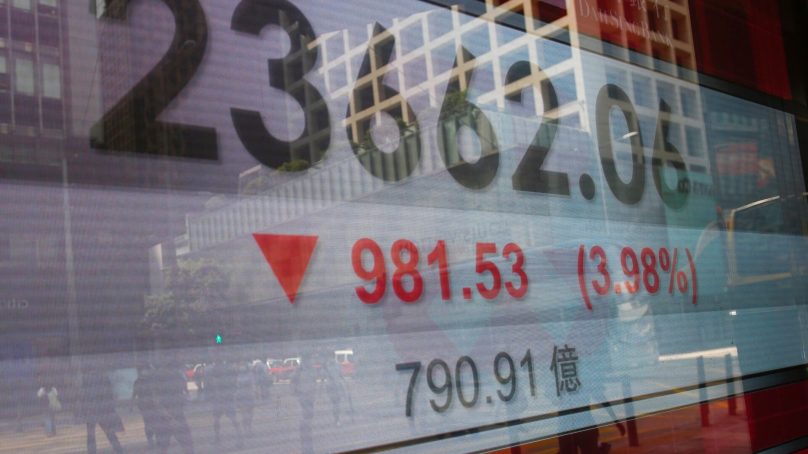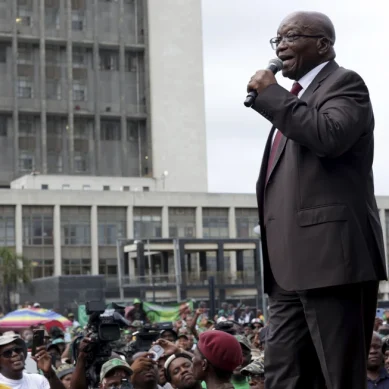
Global shares eased, oil prices surged and US bond yields fell on Friday after reports that Israel attacked Iran, in the latest reminder of how the Middle East tinderbox is casting a growing shadow over markets.
Israel’s attack on Iranian soil was the latest tit-for-tat exchange between the two arch foes, sending safe haven currencies such as the yen and Swiss franc higher and putting gold on track for its fifth week of gains.
Oil prices jumped $3 a barrel on concern that Middle East oil supply could be disrupted, but later pared some of the gains after Iran said it has no plans for an immediate retaliation, denying that any attack had taken place.
US Treasuries rallied, pushing down yields on the benchmark 10-year bond to 4.5899 per cent.
The MSCI All Country stock index was down 0.38 per cent at 746.54 points, retreating further from its lifetime high of 785.62 points a month ago, although still up about 3 per cent for the year.
In Europe, the index of 600 leading companies was down 0.7 per cent. Markets are caught in the crosshairs of a “triple whammy” – a US Federal Reserve reluctant to cut interest rates, disappointing semiconductor earnings, such as at Taiwan’s TSMC and rising geopolitical risks.
Naka Matsuzawa, chief macro strategist at Nomura in Tokyo said the events in the Middle East exacerbate the trend of rising global inflation expectations.
Labour market data out Thursday, as well as a gauge of manufacturing, showed a resilient US economy in the face of higher interest rates.
“This is not just a Middle East thing that causes the risk off now. More fundamentally, it’s the fading rate-cut expectations by the Fed, and on the back of it is higher inflation expectations, and this conflict…makes the thing worse basically,” Matsuzawa said.
US stock index futures were down about 0.4 per cent with no major data expected before the opening bell.
Netflix will be an initial focus on Wall Street after its shares fell after-hours on Thursday when the company unexpectedly announced that it will stop reporting subscriber numbers each quarter, seen as a sign that years of customer gains in the streaming wars are coming to an end.
Ross Yarrow, managing director of equities at RW Baird, said the tensions in the Middle East have the potential to tick the two biggest inflation risk boxes.
“The first of that is an oil shock – we have seen this tape play out before, with Brent over $100 a barrel and so on,” Yarrow said.
“The other is container shipping costs,” Yarrow said, adding that so far there was no sign of these going back up after their blip higher earlier in the year due to tensions in the Red Sea.
Meanwhile, first quarter earnings season gets underway, with market expectations quite low with pressure on a narrow group of stocks to perform, Yarrow added.
Equity markets were already heading lower before the Middle East headlines, as more robust US economic data spurred additional Fed officials to signal no rush to lower interest rates.
Chip-sector stocks were hit particularly hard by both the outlook for protracted tight monetary policy and investor disappointment at Taiwan Semiconductor Manufacturing Co’s (2330.TW), decision to leave capital spending plans unchanged. The stock slumped as much as 6.6 per cent.
A day earlier, ASML the largest supplier of equipment to computer chip makers, reported lacklustre new bookings. MSCI’s broadest index of Asia-Pacific shares was down 1.7 per cent after earlier diving as much as 2.6 per cent.
The safe-haven yen rallied as much as 0.7 per cent against the dollar but was last trading little changed on the day. The Swiss franc was about 0.6 per cent higher versus the dollar, paring earlier gains of as much as 1.2 per cent.
Gold was 0.3 per cent higher at $2,385 an ounce, but had risen as far as $2,417.59, just shy of last week’s all-time high at $2,431.29.
Brent futures surged as much as 4.2 per cent and were last up 0.9 per cent at $87.95. Iran is the third-largest oil producer of the Organization of the Petroleum Exporting Countries, according to Reuters data.
Bitcoin was up 1.6 per cent at $64,559. Japan’s Nikkei was last down 2.6 per cent, while Taiwan’s stock benchmark (.TWII), fell 3.8 per cent. Hong Kong’s Hang Seng (.HSI), lost 0.9 per cent.
- A Reuters report











